I hear the sirens and air horns now, especially the air horns. Not every time I hear them, but sometimes. Suddenly I am back on the trucks. Pulling on my bunker gear. Looking up a street on the map. Shouldering the straps to my air tank. Pulling up my three quarter boots. Putting on my gloves. I am back in it. I am back on the street. I can almost hear the radio traffic.
“Engine 1, Engine 51, Tower 1, Rescue 1, District 1 house fire….”
“Engine 7, Rescue 7 shooting. OPD is not on the scene….”
“Rescue 1, Rescue Boat 1 respond to assist Engine 7 and Rescue 7 with a drowning….”
“Engine 6, Engine 4,Crash 6, Rescue 6, Tower 1, District 1 plane down…”
“Engine 3, Rescue 3 person not breathing…”
“Engine 10, Tower 10, Rescue 7 District 2 accident with injuries involving entrapment…”
I can almost feel the adrenaline rush. See the red lights of the trucks. Hear the roar of the diesel. Then dispatch would give the report that always meant you had something serious.
“We are receiving multiple calls.”
“We have reports of people trapped.”
“CPR is being performed.”
Then I find myself listening for the reports from the first units to arrive.
“Engine 1 to dispatch we have heavy fire showing from a single story wood frame structure. We are pulling an inch and three quarter line.”
“Engine 6 to Orlando we have a single engine plane down in a tree. No fire. But we do have a fuel leak. Be advised the passenger and the pilot are trapped.”
I am back on the street. That place I named so long ago, the other reality that exists just outside most people’s everyday work a day lives. It is a place that seems to exist in parallel to daily existence. Yet it is only a car accident or cardiac away for everyone.
The street was more than a physical place. It was a place where all of the safe guards end, and our job begin. It is a place filled with excitement, fear, tragedy, horror, sadness, despair, joy, and laughter. It was a place where everyday decisions had terrible consequences. I am going to the grocery store. Or I will the wiring fixed next month. Where people died or were horribly injured. It was terrible place. Or maybe it is reality. It was where I worked.
The street existed in the poorest homes in Orlando, and in the richest. It existed in back alleys and the main streets. It existed in brush fires, house fires, shooting, stabbings, hangings, cardiac’s, codes, drowning’s, and a thousand other emergencies. It was everywhere around. I have houses or intersections that had been scenes and now were signposts in my life. That house is where I pulled the woman out of the fire that afternoon. I pass the intersection where all those people died on that Thanksgiving night when I go to the YMCA. I can see where I had the double shooting from the East/West Expressway. I can see where we tried to save a mother and three children that night in that fire, each time I get on the interstate. Across the street from those apartments is where we found that body that had been undiscovered for three days in the Florida heat. The reminders of the street and the years I spent on it are everywhere around me, like some kind of map of my life. A map that marks life-changing event for me and those I tried to help.
When I remember the street I always remember it at night, as if that were the only time when bad things would happen to people, and I would have to pick up the pieces. Not just night, but the middle of the night on old Rescue 1. Those early adrenaline filled nights. Where you were wired to every bad thing happening in the city through the radio. That three in morning time when only the cops, the drunks and us are left to prowl around in some kind of three way dance. The kind of dance that leaves people lying in the gutter bleeding from a head wound, with the stunned how did this happen look on their face.
My partner and I are heading back to the station after the 20th call since we had came on duty at eight am the previous morning. It had been one of those shifts where none of the calls were serious enough to need our help. A long line of people who fall through the social net and end up using us to solve their small or imagined problems.
Just another long shift filled with sick, lame, and lazy who made me question why I became a paramedic. Where are all the people that needed saving? The world seemed to be made up drunks and squirrels that think that calling the fire department will solve almost any problem. The drunk we just ran on was lying in the street with one shoe off, waving his foot at us. “I hurt my foot” he said. The woman who after careful questioning and a through physical exam chief medical complaint was she “felt foolish”. The drunk being arrested by the cops who cursed us out as we tried to bandage his head.
Just another night on Rescue 1 where my life seemed to shift into fast-forward the moment I stepped on the truck in the morning. The fires, shooting, stabbling, assaults, man downs came at me so fast, that I thought I could put my hand out the window let it surf through them as they rushed past. Like I did when I was a kid and stuck my hand out of the window of the car as my parents drove me home from a day out.
With each of the runs I got the same adrenaline shot that I did when it turned out to be life threatening. Then someone presses the button on my life and the fast forward drops into standard play. The twenty adrenaline rushes have left me exhausted and used up. Suddenly in the Florida heat my uniform is damp and sticks to me, from constantly sweating as we drive the streets of Central Florida with no air conditioning. I lean against the door feeling as if I did not lean against something; I would fall over and go to sleep.
My head is fuzzy with fatigue and aches with a dull throbbing. My stomach is trying to eat its way out. All the adrenaline rushes have emptied my tank of anything I ate today or yesterday. My eyes feel as if someone has put sand under them each time I blink. All I want to do in the world is to lie down and go to sleep for just one uninterrupted hour, just one silent quite hour. All of this rolled together became what I used to call the Rescue 1 Blues. A physical and mental state that was truly unique and miserable.
The only lights are the bronze halogen streetlights that cast an eerie light that is somehow depressing. Then through all of the fatigue, physical discomfort and just plain, I don’t want to do this, the radio in the truck blares.
“Rescue 1 can you take another call.”
I want to run screaming away from that radio, but I pick up the mike and say,
“Check”.
“Unknown illness to a child. 1492 Paramore.”
“Rescue 1 responding.”
I flip on the lights and turn on the siren and we head for the address. The red box lights reflect off the windows of the stores and buildings of downtown as we head for the wrong side of things. Where we are the doctors to those that do not have the money or insurance for real doctors. Tonight it seems too melodramatic, red lights flashing as the truck rushes through the empty streets. We know by the dispatch is going to be some minor.
When we turn on Amelia and go under the Interstate, it was as if we had entered another reality. One where you could almost taste the hopelessness, the anger and the frustration of the people who were so close to the money yet so far away.
We find the address in front of a small two-story apartment building. No lights are on and everything seems locked up tight. We cross the grey sand front yard, strewn with beer bottles and trash. Larry and I walk up to the second story of the apartment on the bare concrete stairs. When we reach the apartment we stand on either side of the door. You never stand in front of a door, you don’t know who is on the other side or what they might have in mind.
“Fire Department. Did someone call?” I yell as I knock on the door.
A young girl opens the door immediately. She is in her late teens, a crying baby is in her arms. She has a look of real concern on her face.
“What seems to be the problem?” I asked.
“He’s running fever and coughing. I..”
She handed me the baby. I looked down at him as I cradled him my arms, just like I did with my own son at home. The baby was hot to the touch, but not anymore than my son had been the last time he ran a fever. We examined him and questioned the mother. It looked as if the worst thing he had was a cold.
“He’s fine. Looks like he has a cold. Do you have any Tylenol? It would lower his temperature and make him sleep better tonight. You could take him to the doctor tomorrow?”
“I don’t have any Tylenol?” her voice and the look on her face showed real fear.
The concern and fear in her face let me know that what was happening as much as anything. Here was a young girl all alone with her first child and no one to go the drug store to get the Tylenol. She was out on a limb doing the best she could to take care of the baby by herself. She had run out of energy dealing with the child and herself. She needed some help. The apartment was clean and well furnished. It was obvious she was doing a good job no matter what her support system was day to day.
“Look he is going to be fine he just needs some Tylenol and some antibiotics. Do you want to go to the hospital with him?”
“What do you think?”
“Yes, I think that would be a good idea. We have an ambulance on the way. Do you want to go by ambulance?”
“Yes. Yes I do.” the relief on her face was enormous. She just needed someone to help her. Nothing fancy, nothing dramatic, just someone to share the load of being a parent. Not something I thought I would be doing when I went to paramedic school.
As I stood there with the crying baby, I could feel the relief in her as she gathered things for her diaper bag she would take to the hospital. She had the support she needed, it did not matter it came in a red rescue truck. She had someone to ask what to do, and then they had the means to solve her problem. Not a big problem in scheme of things, but it was everything to her.
When the ambulance arrived we walked her out to the rig, and helped her into the back. It was not the type of problem the system was designed to handle, but it was the type of problem we faced daily. No sophisticated medical skill needed here. No special training. It just took a willingness to help. These types of calls would sometimes fill a shift. Back then they were forgotten as soon as I finished the paper work. But now they are the ones that come to mind first when I think of the street twenty-six years later. Not the Smoking Babies, those only came up through some unrecognized trigger that throws me back on the scene.
The little ones come to mind now, the ones I thought I would forget as soon as they were over and the big ones piled on top of them Only through years on the street did I realize that maybe these would leave as much of a lasting impression as the big ones. There were a lot more of these than the big ones, maybe that is why this one, and others like it stuck in my memory. The genuine appreciation for the help given that was so apparent.
With the Smoking Babies the multiplier emphasized the absolute horror way beyond any understanding of your role in what happened. Or with so many of the others, the scenes were filled violence or hopelessness, with anger at the system, resentment the of authority you represented, or frightening abdication of personal responsibility for even the most basic human survival skills, that it was hard to glean out the fact that they did need your help.
So when these pure crystal clear moments happened they now stand out through it all. The street does give back to you, but it buries it under the violence, the stupid deaths, the drowning, the senseless deaths, the shootings, the hangings, the stabbings, the cuttings, the accident with injuries, the fires, the plane crashes, the drunks, and crazies. So if you are not paying close attention you loose them. You loose them to the big calls where no matter what you did everyone was going to die anyway. You loose them to the mental and physical fatigue that comes with seeing so much. So I now try to hold onto those good simple ones because the big ones are too big to understand so much of the time.
I spent twenty-six years in the fire service. That is over half my life. Not half my adult life but half my as a whole. What you do in this world shapes you, changes you. On the street what you see and do changes you in a way few other professions do. Adrenaline rushes, fear, elation, sadness all can happen on a single call that is part of a twenty run marathon of life, death and a lot of in between. It is all rolled up into single twenty-four hour shift that can cram more profound experiences than someone does in years of regular eight to five living. Combine the years and decades of those shifts and it changes you, and shapes you into something and someone else. Someone you weren’t when you started. It is ground into your skin, like a good mechanic, who no matter how much he washes his hands still has dirt under his fingernails. I still have the street under my fingernails. It will not wash off. If you scratch me I will bleed a story. I am a firefighter/paramedic. Even after years of retirement, it is who I am. How do you come to a job that shapes you into something you were not before?
We all come to the job for a variety of reasons. Some came because their father was a firefighter. Some came because of the excitement. Some came because it is a steady and reliable paycheck. And why did I make the decision to be become a firefighter? Me, I spent twenty-six years in the fire service because of a couple of television shows and a book.
It seems aimless of me to let popular culture drive my professional choice, but I am a product of the first television generation. Popular culture is the creator of myths in our society. And like the storytellers of old those myths are meant to provide guidance.
I loved the television show M*A*S*H. I never missed an episode. One night as I watched the opening scenes of the nurses and doctors running up the hill to the landing pad, their faces filled with intensity and purpose, it struck me that while they were actors that had really happened. There had been people whose job provided that challenge and purpose. I wanted a profession that provided that kind of intensity. That provided that kind of challenge, but I had no idea of what that looked like.
I knew I didn’t want to be a doctor, but I had no idea where I could find that combination of danger, intensity and service. I knew the military was not what I wanted. I did not want a profession whose object was to kill people. I had seen what that did to men close up during my own years in the service.
Then I read a book, Report from Engine Company 82 by Dennis Smith a New York City firefighter. Still the single best book about firefighting and the fire service ever written. It was a gritty account of his firefighting experiences on one of the busiest engine companies in the world. It had all of the everyday heroics and dedication I was looking for in a profession.
This was also about the time that a new television show aired. It was Emergency. It was based on the first fire department paramedics on the Los Angeles fire department. It was cheesy and hokey but I loved it. They fought fires and provided emergency medical services in the field. They saved everybody. It was great. I guess I needed the visuals to convince me. I joined the Department when I graduated from college.
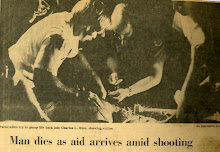

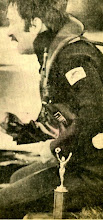
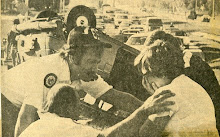
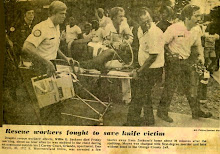
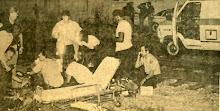

No comments:
Post a Comment